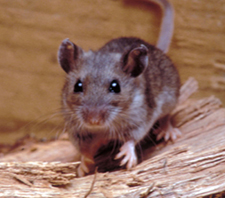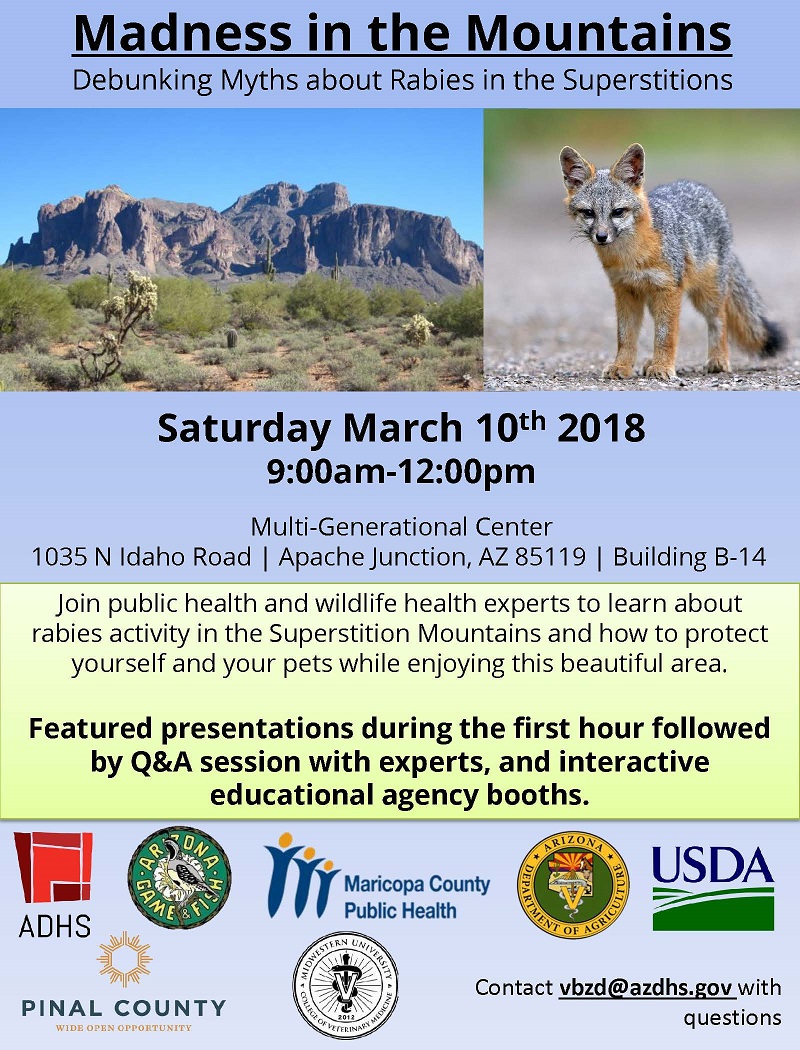
Hantavirus was first discovered in 1993 in the Four Corners region of the United States—an area shared by Arizona, New Mexico, Colorado, and Utah. The disease is carried by many types of rodents, including the deer mouse. People can be exposed to hantavirus by breathing in infected particles from rodent urine or droppings, as well as through direct contact with wild rodents or their nesting materials. Signs of hantavirus infection usually occur within one to five weeks after exposure, and include fever, muscle aches, dizziness, nausea, difficulty breathing, and coughing. Animals do not show signs of being sick, but in people, the virus can cause a severe and sometimes fatal illness called hantavirus pulmonary syndrome (HPS).
In Arizona, hantavirus infection often occurs sporadically and in rural areas, usually in the northern region of the state, but infected rodents can be found statewide . Cases most often occur during the winter and spring months. This may be due to people coming into contact with rodent droppings while cleaning out garages and sheds that have become infested with rodents during the winter. Exposure can also occur around the workplace or outdoors.
The April edition of Emerging Infectious Diseases features an article on “Exposure Characteristics of Hantavirus Pulmonary Syndrome Patients, United States, 1993–2015,” written by epidemiologists at our agency in collaboration with partners from local, tribal, other states, and federal agencies including the Centers for Disease Control & Prevention. The article reviews 662 HPS cases reported during a 22 year period and discusses demographic factors and common settings for exposure. The authors identified that educational materials shared with persons at high risk of exposure should contain regionally and culturally appropriate prevention messages.
To prevent hantavirus infection, it is important to avoid sweeping up rodent droppings when cleaning. Use a solution of one part bleach to 10 parts water and wear a mask and gloves. Store food in rodent proof containers and seal holes in and around the home to prevent rodents from entering. Visit a doctor if exposure to rodents or rodent droppings has occurred and if any signs of illness develop. For more information, contact your local health department or email [email protected].












Very informative article. Are there things i can do to deter the rodent from entering the home in the first place. Are there specifc smells from organic products/herbal stuff that repels rodents?
Hello Andy,
Thank you for contacting the Arizona Department of Health Services. To keep rodents away, public health recommends that people seal up, trap up, and clean up. Mice can squeeze through a hole the size of a nickel, and rats can squeeze through a hole the size of a half dollar! Prevent rodents from entering the home by checking inside and outside the house for gaps or holes and sealing them up. Trapping rodents around the home may also help reduce the rodent population. Choose an appropriate snap trap. Traps for catching mice are different from those for catching rats. Lastly, eliminate possible rodent food sources or nesting areas inside and outside the home. Keep food containers sealed in thick metal containers, including pet food. Frequently throw away any food trash that may be stored in the house. Strong smells can deter rodents, but there is not a specific product that is recommended to repel rodents. We suggest consulting with a local pest company or your local vector control agency. For more information on preventing rodents, please visit https://www.cdc.gov/hantavirus/hps/prevention.html.